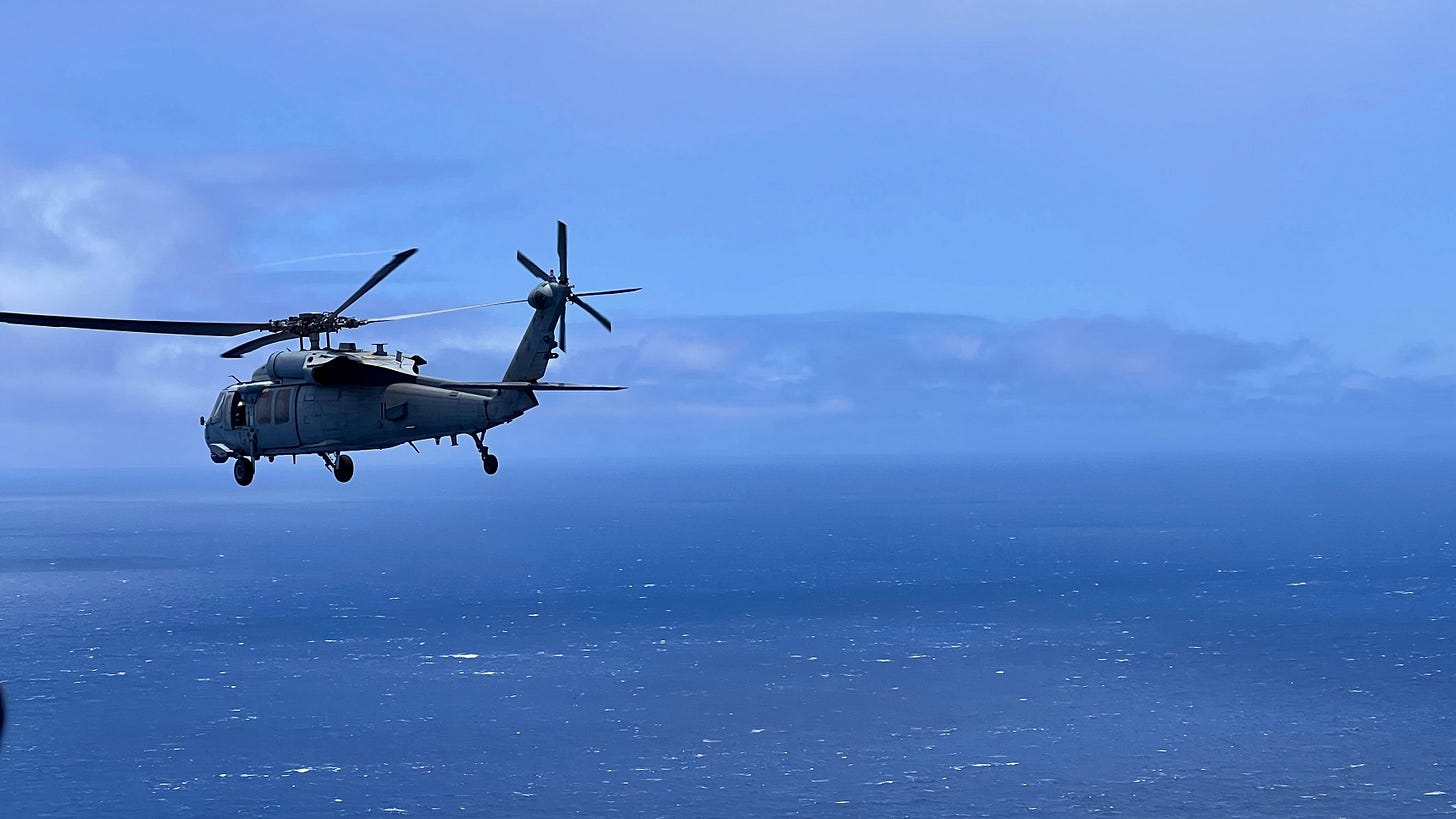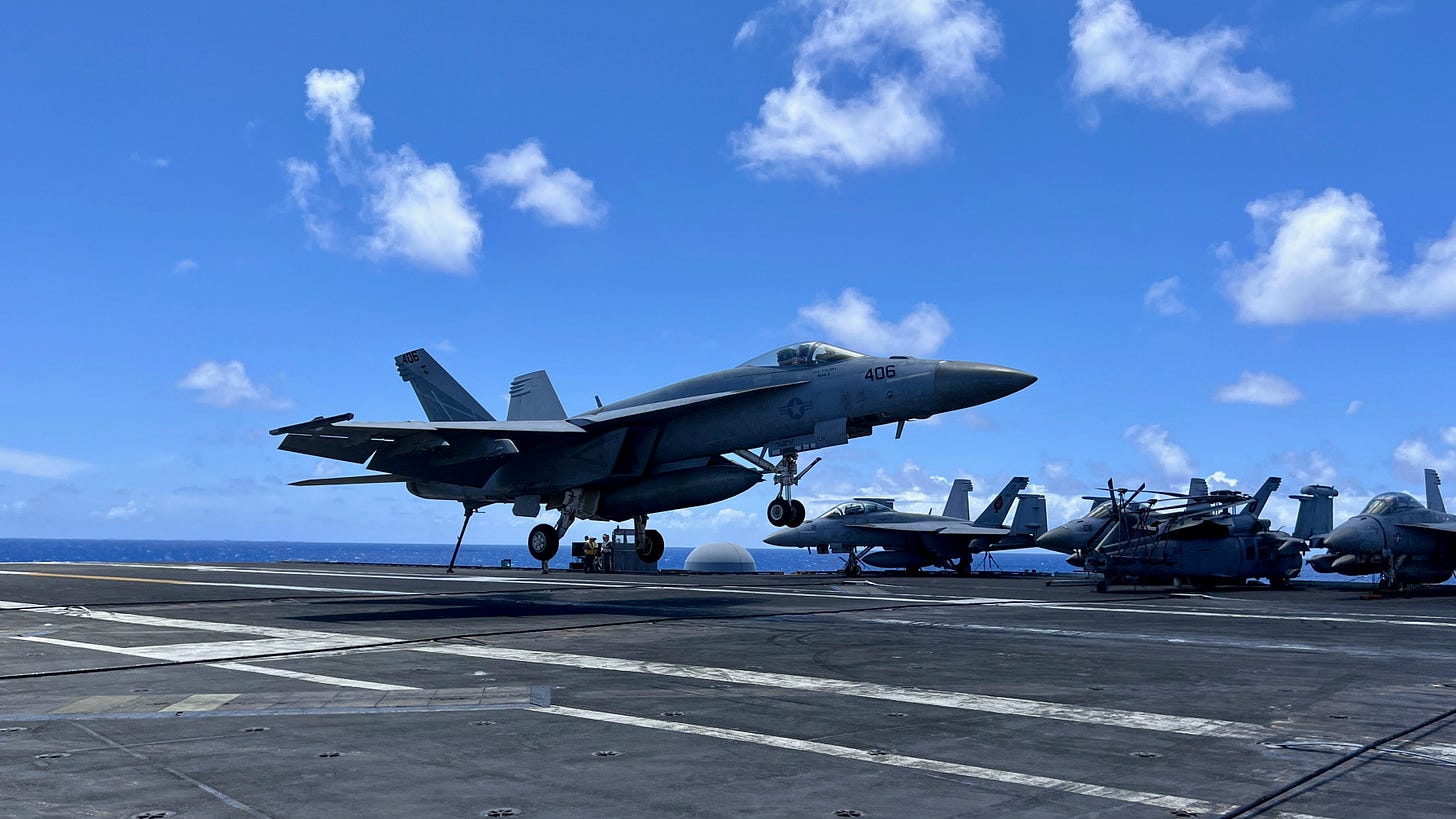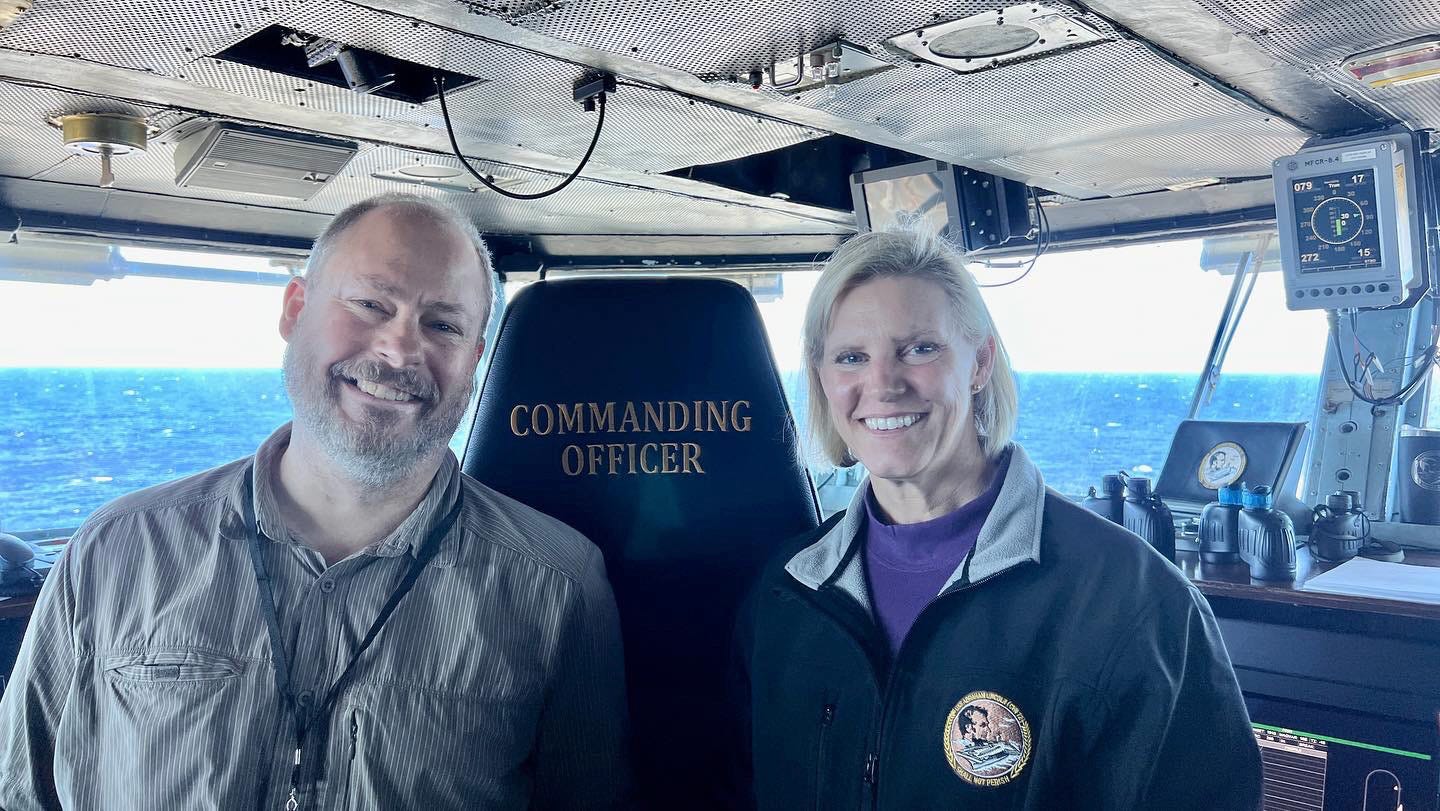Iraq, Nicaragua, and other world news
(Flying out to the USS Essex during RIMPAC)
Happy George Jetson’s birthday! Somewhere in the world, someone is giving birth to the future historical figure — or is he a historical figure of the future?
Anyhow, July has been a busy month, personally and in the world of international affairs. The personal highlight is that I signed a contract with Madville Publishing to publish my book next year. So, Passport Stamps: Searching the World for a War to Call Home will be available for pre-order sometime in the spring. I will obviously keep you posted.
Globally, the war in Ukraine continues as Ukrainians keep up their bold resistance to Russia’s invasion. The United States continues to send weapons of increasing sophistication, and Ukraine keeps asking for more. I personally feel the United States needs to keep turning up the heat — through sanctions, working with the international community to find alternatives to Russian petroleum, and through military means — on Russia to a point where the only move Putin can make is to retreat.
Questions remain about Putin’s calculus and his willingness/ability to abandon sunk costs and find a way out he can sell to his people as some sort of a win. That’s where things remain hazy, and it’s hard to see him walking away anytime soon.
Were it not for Putin’s war, there would be several other international stories getting more attention. Afghans — particularly women and girls — continue to suffer under the Taliban regime, and clashes have broken out between the Taliban and Iranian border forces.
Protesters forced the Sri Lankan president to flee the country. The successor, Ranil Wickremesinghe, is struggling to right the ship and contend with a floundering economy that defaulted on its foreign debt earlier this year.
Myanmar executed political activists, China is angered by Nancy Pelosi’s possible trip to Taiwan, and U.S.-Saudi relations remain fraught.
If that weren’t enough, things in Iraq took a troubling turn. The country has failed to form a new government after elections last October. Anti-U.S. and anti-Iran cleric Moqtada Sadr’s party won the most seats in the election, but not enough to form a government without building a coalition.
Since then, his efforts have failed in the face of maneuvering and opposition from Iranian-backed parties. In June, Sadr called for his members to resign their seats.
Nouri al-Maliki, the recalcitrant former prime minister with strong ties to Tehran, has tried to use the chaos to his advantage and return to power.
Sadr’s supporters took to the streets and stormed parliament. The scenes of Iraqis occupying their parliament are eerily familiar.
I have joked — darkly, as I often do — in the past that the United States did too good of a job in exporting democracy to Iraq as that country has embraced all the worst elements of American politics: toxic partisanship, tribalism, weaponization of information, and now the storming of the halls of power.
It's bad on many levels. The Iraqi economy has been a mess for years and the country has been operating without a 2022 budget — perhaps another quality Iraq learned from the United States, the inability to pass budgets in a timely, responsible manner.
However, the biggest beneficiary of the political chaos could be ISIS. One of the groups’ hallmarks is using political division and instability and lack of governance to recruit and operate. The longer Iraq is in turmoil, the greater the chance ISIS will benefit and continue its ongoing efforts to rebuild and resurge.
Elsewhere, Nicaragua is still holding dozens of political prisoners, including my friend and classmate Felix Maradiaga. Last week, I attended a small dinner with his wife Berta, Victoria Cardenas (the wife of prisoner Juan Sebastián Chamorro), their lawyer, Leopoldo Lopez — a former Venezuelan political prisoner represented by the same lawyer — and some grad school classmates who have been working to raise money and awareness about Felix’s plight (you can contribute here).
The conversation was off the record, but there are a few general points I can share. There has been a slight improvement in Felix’s prison conditions and there are hopes for future improvements. Efforts by Berta and her team to build political support in the U.S. and European governments are continuing and gaining momentum.
There are parallels between Putin and Nicaragua’s Daniel Ortega. Simply put, they are both bad actors acting badly right now. However, whereas Putin presides over a major power with nuclear weapons — hence he can act badly on a much larger scale — Ortega rules the second-poorest nation in the western hemisphere.
While Russia and China nominally support Ortega, Nicaragua doesn’t offer them enough to go to the mat for Ortega. In other words, he’s weak.
That means there would be little cost or blowback should the United States choose to drop the hammer on Ortega to get him to release the prisoners. Obviously, the concern is taking action that could harm the people of Nicaragua who don’t deserve to be punished for living under a dictator.
Hopefully, the United States and Europe will get together put together a package of carrots and really big sticks to drive Ortega to release the prisoners. Unfortunately, Ortega is pretty low on the priority list given Ukraine, China, Iraq, Afghanistan, Myanmar, Saudi Arabia, and other places that are of greater international consequence and with larger political constituencies to drive action.
Stay tuned
Lastly, I spent a week in Oahu attending the Rim of the Pacific 2022 international military exercise (I know, rough assignment, but they can’t all be Helmand or South Sudan). It’s a biennial Navy-led exercise for the U.S. services and allies to work on interoperability and to develop capabilities to respond to disasters and deter and combat adversaries in the Indo-Pacific.
In the past, China has participated as an observer, but not anymore. While U.S. officials involved in RIMPAC have been circumspect about saying the exercise is designed to send a message to any one particular potential adversary, there was no shortage of conversation about China while I was there.
Since my assignment was to focus on the technology and capabilities involved, I didn’t have to wade into the geopolitics. Instead, I sat back and watched the cat and mouse game between journalists from South Korea, Japan, and Taiwan asking questions about RIMPAC and China, and military public affairs officers trying to head off such questions and keep the media focused on the specifics of the exercise.
RIMPAC also generated some interesting reaction in Chinese and pro-China media (here and here).
I will be writing a few pieces for the September issue of National Defense Magazine, so I’m not going to steal my own thunder and discuss further details of RIMPAC here. I can say that the highlight of the trip was spending a couple of hours on the USS Abraham Lincoln watching aircraft take off and land and chatting with the only woman to command a U.S. aircraft carrier.
Next month, I will be fine tuning my book to deliver to the publisher, so subscribers can expect some more outtakes from my adventures.



